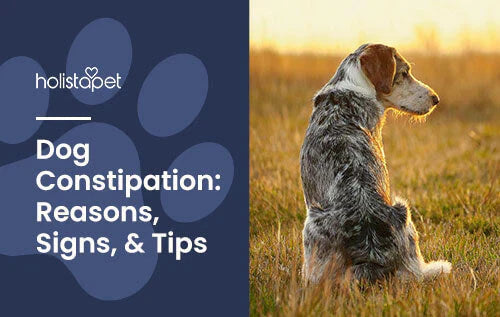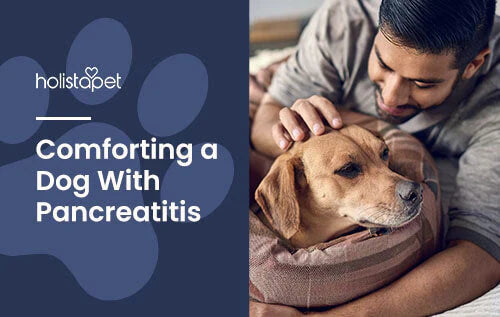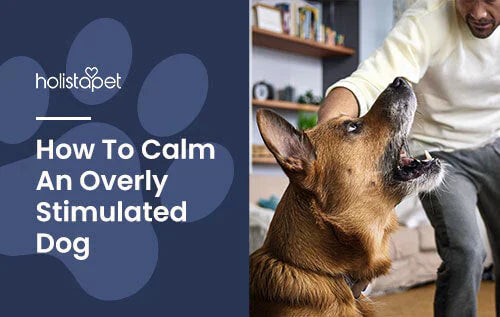Dog constipation can sneak up on even the healthiest pups. It happens when your dog's digestive system slows down, making it difficult for them to pass stool. If your furry friend is having fewer bowel movements or straining during potty breaks, they might be dealing with constipation.
Many pet parents can't bear to watch their dear dogs in discomfort. Thankfully, by spotting the signs of your dog's constipation early, you can take quick action to help ease their tummy troubles. Let's look into what causes canine constipation and how to keep your dog's digestive health tip-top.
Common Causes of Dog Constipation
Many factors can lead to constipation in dogs. Pinpointing the cause is the first step in helping them feel better:
- Dehydration. Without enough water, your dog's stool can become dry and hard, leading to blockages.
- Low-Fiber Diet. Fiber helps with smooth digestion, and a lack of it can slow down bowel movement.
- Eating Non-Food Items. Like many other dogs, your pup may love to explore with their mouth. But swallowing a foreign object can clog their digestive tract.
- Lack of Exercise. A sedentary lifestyle can cause your dog's digestive tract to slow down, making it harder to go regularly.
- Aging. Older dogs often experience slower digestion, which can cause constipation.
Dog Not Pooping: What Could Be Wrong?
It's often a sign that something's not right when your dog stops pooping like usual. Constipation could be the culprit. A constipated dog is usually dehydrated, lacking in fiber, or feeling distressed.
Other possibilities could be blockages or underlying health issues. Identifying what's wrong early can help you get your furry buddy back to their normal schedule in no time.
Dietary Issues Leading to Constipation
If your dog's diet lacks fiber, it can really slow things down and make it hard for them to go. Fiber is like the magic ingredient that helps keep things moving smoothly.
Feeding too much dry food without enough water can also be a problem. Even giving new treats or changing up their food too quickly can mess with their digestion and lead to mild constipation.
Lack of Exercise and Its Role in Constipation
When dogs lack physical activity, their digestion can slow down and cause constipation. Without enough movement, things can back up, making it tough for them to pass stool.
Daily walks and playtime can help keep everything moving through your dog's digestive tract. A little more exercise might be just what they need to get things going again.
Signs and Symptoms of Constipation in Dogs

Learn to spot the signs that your dog's constipated so you can help them feel better, stat. Here are some common dog constipation symptoms to watch out for:
- Straining to Poop. Most dogs with constipation squat frequently and struggle to pass normal stool.
- Hard, Dry Stool. If your dog's stool looks hard, like small pebbles, it could be a sign of constipation.
- Decreased Appetite. A constipated dog might eat less due to physical discomfort.
- Lethargy. A constipated pup may seem more tired or less interested in playtime.
- Swollen Abdomen. Your dog's abdomen may appear bloated or hard, indicating constipation.
- Passing Stool Less Often. If your dog is doing number twos less often than normal they could be experiencing constipation.
Recognizing When Your Dog Is Struggling to Poop
You'll probably notice it pretty quickly if your dog's having a hard time pooping. They might squat over and over but not actually go, or they may strain a lot without much success. You might also see them looking uncomfortable or restless during potty time.
Your pup's actions can tip you off to their struggle. Keep an eye on their behavior, and if things seem off, take immediate action.
Hard Stools and Straining: Common Symptoms
One of the clearest signs of constipation in dogs is hard, dry stools. These stools might look like small pebbles.
If your pet is straining but not producing much, or if what they do pass is hard and dry, it's a sign that their digestion needs help. If ignored, it can lead to chronic constipation, making your pup avoid going altogether, which only makes the problem worse.
How To Relieve Constipation in Dogs
There are several ways to help your furry buddy get things moving again and feel better. Check out these tips:
- Increase Fiber. Add high-fiber foods like canned pumpkin or dog-safe pumpkin pie filling to help soften their stool and promote normal bowel movements.
- Provide More Water. Make sure your dog has access to fresh water to prevent dehydration, which can worsen constipation.
- Exercise Regularly. Move with your dog to help stimulate their digestive tract.
- Try Canned Food. Consider wet food. Adding it to their diet can provide extra moisture and help move things along.
- Use Gentle Laxatives. Consult your vet about dog-specific laxatives for relief, especially in more severe cases.
Dietary Adjustments To Improve Bowel Movements
Making simple tweaks to your dog's diet can go a long way. Adding more fiber-rich foods can help keep things moving smoothly. Switching to canned dog food or mixing it with dry food can also add moisture, which softens your pet's stool and makes it easier to pass.
Hydration and Its Role in Digestive Health

Fresh water should always be available to your dog, especially if they eat mostly dry food. Incorporating more moisture into their diet can also help. Staying hydrated not only prevents constipation but also supports overall digestive health.
Exercise: A Simple Solution to Dog Constipation
As we've discussed, when dogs don't get enough physical activity, their digestion can slow down. Daily walks, play sessions, or even some time running around the yard can help keep things moving smoothly in their digestive tract.
Can Probiotics Help With Constipation in Dogs?
Yes, probiotics can be a great help! These good bacteria support your dog's digestive system by helping balance gut health, which can help improve bowel movement.
Adding probiotics to your pup's routine may help prevent occasional constipation and promote healthier digestion overall. It's a simple, natural way to keep things moving smoothly and make sure your dog stays regular.
The Role of Probiotics in Supporting Digestive Health
Probiotics are healthy bacteria that help break down food and absorb nutrients. Their support can lead to better digestion and less constipation. When your dog's gut is in balance, their digestive system works more efficiently. This means probiotics can be a natural way to help keep constipation at bay.
When To Introduce Probiotics to Your Dog's Diet
Give your dog probiotics during times of digestive issues, like constipation or irregular bowel movement. You can also add probiotics to their regular wellness routine to help prevent problems before they even start.
Speak with your vet to figure out the best time to give your furry buddy probiotics. Adding them at the right moment can make a huge difference in your dog's digestive health.
What Probiotics Do We Offer?
At HolistaPet, we offer Probiotic Soft Chews for Dogs that are both tasty and packed with benefits. These chews are a simple and delicious way to support your dog's digestion, helping to keep things running without a hitch.
Our soft chews contain only natural ingredients, featuring a proprietary blend of 9 beneficial bacteria—a total of 3 billion CFU. Plus, they're perfect for dogs of all sizes. Not only will your dog love the taste, but you'll love the peace of mind knowing they're getting the gut support they need.
When To See a Vet for Dog Constipation
While occasional constipation can be normal, there are times when a vet visit is in order. If your dog's constipation lasts more than a couple of days, or if they seem to be in a lot of discomfort, it's time to see your vet.
Other signs that may require a veterinary appointment include vomiting, a swollen belly, or a major change in behavior. Quick and early action can help prevent more serious issues, so stay proactive.
Signs That Require Professional Attention
Stay alert at all times. If your pup shows any of the following signs, it's time to get them to the vet:
- No Pooping for Over Two Days: If your dog hasn't pooped in more than 48 hours, they could be dealing with a serious blockage.
- Vomiting. This can indicate a more severe issue related to constipation or other digestive problems.
- Swollen Abdomen. A hard or bloated belly could be a sign of trapped stool or other complications.
- Lethargy. If your dog seems unusually tired or uninterested in their usual activities, constipation could be causing them distress.
- Straining Without Results. Repeated squatting without producing any stool is a clear sign something's wrong.
Final Thoughts - Dog Constipation
Dealing with your dog's constipation doesn't have to be stressful! With a few simple tweaks to their diet, regular exercise, and plenty of water, you can keep your pup's digestion on point.
At HolistaPet, we've got just the thing to help. Our Probiotic Soft Chews are a tasty way to support your dog's gut health. Give your furry friend the boost they need to stay regular and feel their best. After all, a happy pup means a happy pet parent!







![Probiotics For Dogs [Soft Chews] - HolistaPet](http://www.holistapet.com/cdn/shop/files/Probiotic-Infographic-1_472d7a29-e30c-435a-9638-1365d8c3a9f9.jpg?v=1725384841&width=104)




























Leave a comment
All comments are moderated before being published.
This site is protected by hCaptcha and the hCaptcha Privacy Policy and Terms of Service apply.